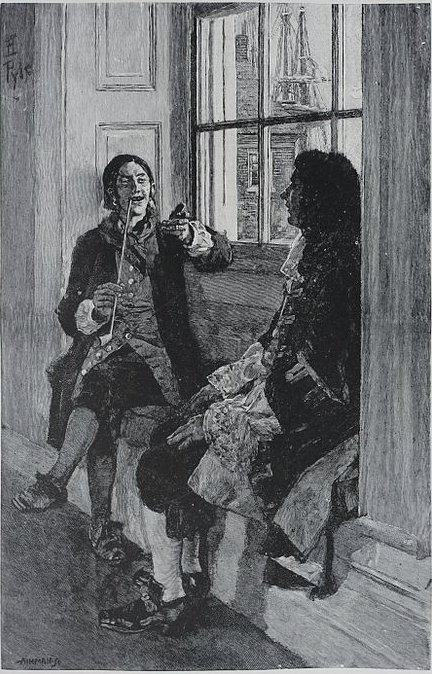Pirates and Pesky, Prolonged Perceptions

I write this from Rhode Island, which lays claim to numerous historical pirates such as Thomas Tew. Piracy was part of the historical international economy that was powered by sea transport. Yet it came to color stereotypes of particular nations. Such misperceptions and their effects are long-lived. This post offers a quick look at how piracy became a key element of American perceptions of North Africa. (Ironically, the Arabic term for ‘piracy,’ qarsana, is a loan word from English and other languages, derived from Latin cursarius–see British Library post here).
The United States’ first official contact with North Africa began when “an American vessel out of Boston, the brig Maria, was captured off the Portuguese coast in 1785, and its crew held by corsairs from Algiers. Twelve other ships were captured subsequently and the Americans had to pay $80,000 to obtain the release of the vessels and their crews” (Layachi 12). This early incident helped to color popular American perceptions of Algiers as “that piratical state,” the Barbary states as “a nation of pirates,” and Turkey as “the epitome of despotism” (Allison 15).

In an attempt to resolve the danger of corsairs peacefully, “the United States attempted to negotiate peace with all North African city-states. The only result it obtained was a surprising acceptance by Sultan Mohammed of Morocco to sign a favorable treaty in 1786 without asking for an annual tribute as was the custom then” (Layachi 12). Why was Morocco the only country receptive to a treaty? First, according to John Page, “Mawlay Muhammad had wanted peace with the Americans since 1778,” and was prepared to move quickly without demanding tribute (7). Second, perhaps American businessman Thomas Barclay negotiated the treaty particularly skillfully. Third, Morocco was independent and Mawlay Muhammad had the ability to decide instantly. In contrast, negotiations with the three Turkish provinces (Algiers, Tunis, and Tripoli) “were delayed by changes of personnel, and before they were concluded Algerian corsairs had captured” several American ships (Furlonge 12). Thus “the first treaty the U.S. signed in [North Africa] was with Morocco, which is referred to as the first country to have recognized the new U.S. republic” (Layachi 15).
Morocco had the least to lose by signing a treaty with the United States; Algiers and Tripoli contained the most infamous ports for privateers. In addition, Morocco could use an ally against European influence and probably sympathized with the new republic’s desire for independence. The Turkish provinces risked losing political and financial support from Europe and could gain very little from America as an ally.
Following the limited success of negotiations, a skewed perspective of Mediterranean piracy emerged in early America; it completely disregarded European privateering and European profit from North African corsairs. When Lafayette and Jefferson moved to propose an alliance against piracy, they were dissuaded because “the English and French governments both profited from Barbary piracy and would not permit anyone to stop it” (Allison 14). On gaining independence from Great Britain, the United States’ merchants competed with European rivals and encountered privateers in the Mediterranean which “became known as the ‘Barbary piracy’” (Layachi 12). The term and associated images of violent Muslims continued long after the four years of bloody warfare called “the Barbary Wars” (1801-1805).
Today many Americans retain a vague notion of North Africa as a dangerous place, and most know of Morocco through Hollywood films (most notably Casablanca). Through education and travel, Americans may question the biased and discriminatory images of North Africa as presented throughout American history. For Arabic study options see here or contact me and for reading suggestions see this post and/or consider joining the Middle East North Africa Lit Group on goodreads.com!
Sources: Robert J. Allison, The Crescent Obscured: The United States and the Muslim World, 1776-1815 (Chicago: The University of Chicago Press, 1995); Geoffrey Furlonge, The Lands of Barbary (London: John Murray, 1966); Azzedine Layachi, The United States and North Africa: A Cognitive Approach to Foreign Policy (New York: Praeger, 1990).
